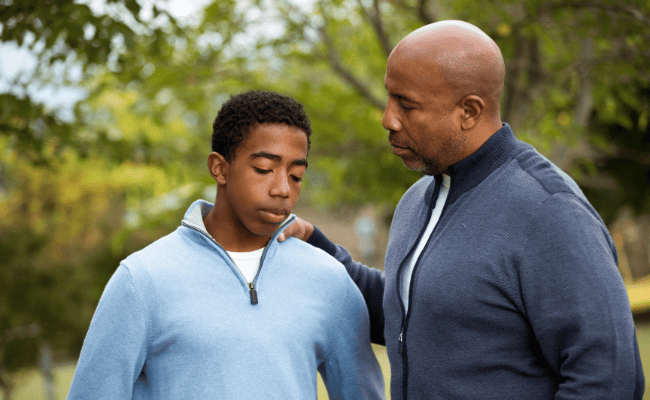Partnering with Your Child for School Success
Mercy Home has been providing educational solutions to kids since 1887. Take a look at these 5 ways to support...
February 11, 2025
April 10, 2023
For the parents of teenagers, it may not come as a surprise when your child suddenly starts spending more time alone in their room or when their moods seem as unpredictable as the weather. Many, if not most, teens report struggling with low moods and anxiety as they cope with the pressures of young adulthood. From final exams to the desire to fit in, they can experience burdensome emotions.
Still, as a parent, it is vital to recognize when your child is struggling with something more serious than typical teenage stress. At Mercy Home, our professional and expert coworkers are trained to recognize when a mental illness disrupts a young person’s everyday life.

An intentional conversation could make all the difference for your child’s health and wellness if you notice:
Despite recent efforts to spread awareness about the warning signs of mental illness, many parents are still in the dark about what these behaviors look like. If your child is exhibiting these behaviors, please intervene as quickly as possible.
Once they know the risks and warnings of mental illness in children, parents can break through with their child by following these steps:
Mercy Home therapist Edward Meredith has provided social work services to Mercy Home’s young men for five years. He listed some of the warning signs of mental health issues that our therapists look for in our boys and girls.
“[Behaviors to notice are if they’re] always worrying, always super anxious about some stuff that’s going on… [or they’re] easily distracted,” Meredith said. “[Also, if they’re] avoiding day-to-day stuff or avoiding structural tasks that we have set in program due to anxiety.”
Before a therapist can prescribe a treatment plan, they help the child understand and accept their issues.
They also ask the kids questions to help them understand their behaviors and feelings.
“[We ask them], what can you do differently? Why are you feeling the way you feel? What is contributed by your sadness? Why are you feeling anxious? How would you picture the situation in order for you to be happy?”
Meredith stated that some parents do not understand their child’s current mental health, and it is important to accept their mental health before change can begin.
Recognizing the signs of mental illness in children is the most critical first step toward healing. As caregivers, being fully attuned to changes in our children can ultimately save lives.
Mercy Home has been providing educational solutions to kids since 1887. Take a look at these 5 ways to support...
February 11, 2025
Four types of love -- storge, agape, philia, and philautia -- prove that our most essential human emotion is not...
February 9, 2025
And suddenly, you’re awoken by a sound that steals you from sweet sleep: The morning alarm. And with it, a...
January 26, 2022
Comments